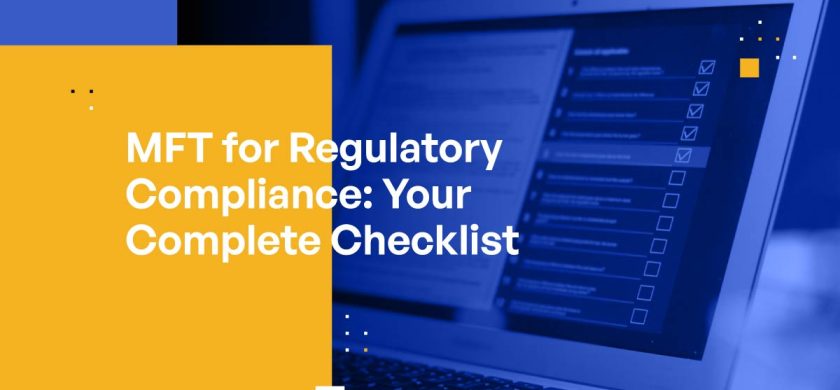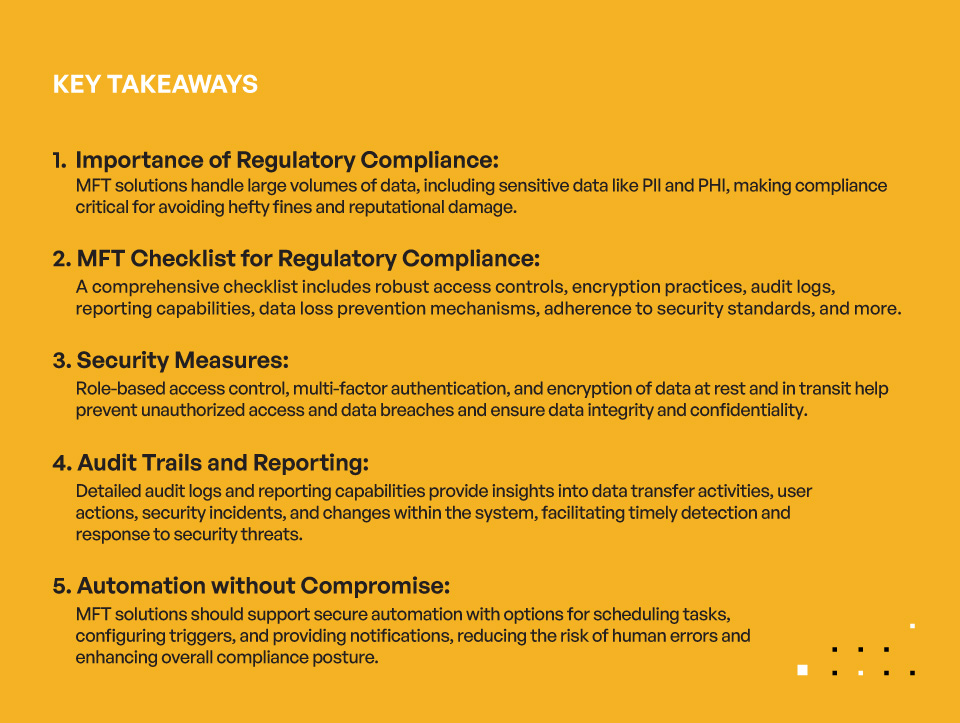
MFT for Regulatory Compliance: Your Complete Checklist
The advent of digitization has significantly transformed the way businesses handle their data. The modern business landscape sees an impressive proliferation of data transfers, such as invoices, statements, and other important documents that play a critical role in business operations. Managed File Transfer (MFT) solutions have thus become a necessity for many organizations to ensure efficient, automated, secure, and compliant data handling.
However, as beneficial as MFT systems are, their use is impacted by an increasing number of data privacy and security regulations. With regulations like the General Data Protection Regulation (GDPR), Health Insurance Portability and Accountability Act (HIPAA), Canada’s Personal Information Protection and Electronic Documents Act (PIPEDA), and the Cybersecurity Maturity Model Certification (CMMC) in place, it is imperative that businesses adhere to these standards to protect Personally Identifiable Information (PII), Protected Health Information (PHI), and other sensitive data. Since the reliance on MFT isn’t dissipating any time soon, organizations must ensure their MFT solution demonstrates regulatory compliance with these and a multitude of other data privacy regulations and standards.
Still debating between FTP and managed file transfer? Here are six reasons why managed file transfer is better than FTP .
Why Regulatory Compliance is Crucial for MFT
Given the wealth of sensitive data processed, transferred, and stored by businesses, regulatory compliance cannot be overstated. Non–compliance with regulatory standards can lead to severe penalties, including hefty fines and damage to corporate reputation. MFT solutions, by their very nature, move large volumes of data, often including sensitive information. Therefore, they must be built and managed with regulatory compliance in mind.
Several regulations have stringent requirements for businesses handling sensitive data to protect consumer and patient privacy. They mandate certain security measures and provide guidelines for the protection and privacy of this data, to prevent unauthorized access, data breaches, and misuse. An MFT solution complying with these regulations not only helps businesses evade regulatory penalties, but also builds trust among stakeholders, making it a win-win situation.
Checklist for MFT Regulatory Compliance
To help you ensure that your MFT solution is in compliance with most data privacy
regulations, we have assembled a comprehensive checklist of security and privacy requirements. This list summarizes key features your MFT solution must have to demonstrate regulatory compliance.
1. Robust Access Controls
The first step towards securing sensitive data is having strict access controls in place. Your MFT solution should have capabilities for role–based access control, limiting data access to authorized personnel only. This helps prevent unauthorized access and data breaches.
KEY TAKEAWAYS

KEY TAKEAWAYS
- Importance of Regulatory Compliance:
MFT solutions handle large volumes of data, including sensitive data like PII and PHI, making compliance critical for avoiding hefty fines and reputational damage. - MFT Checklist for Regulatory Compliance:
A comprehensive checklist includes robust access controls, encryption practices, audit logs, reporting capabilities, data loss prevention mechanisms, adherence to security standards, and more. - Security Measures:
Role-based access control, multi-factor authentication, and encryption of data at rest and in transit help prevent unauthorized access and data breaches and ensure data integrity and confidentiality. - Audit Trails and Reporting:
Detailed audit logs and reporting capabilities provide insights into data transfer activities, user actions, security incidents, and changes within the system, facilitating timely detection and response to security threats. - Automation without Compromise:
MFT solutions should support secure automation with options for scheduling tasks, configuring triggers, and providing notifications, reducing the risk of human errors and enhancing overall compliance posture.
Further, advanced MFT solutions also provide options for setting up multi–factor authentication (MFA). This adds an additional layer of security, making it even more difficult for unauthorized persons to gain access to sensitive information.
2. Encryption
Encryption is a critical facet of data security. In an ideal MFT environment, data should be encrypted at rest and in transit. This ensures that even if the data falls into the wrong hands, it cannot be deciphered without the decryption key.
Moreover, using robust encryption standards such as Advanced Encryption Standards (AES) can provide enhanced protection to your data. It is also essential to ensure that your encryption practices meet the standards set by regulatory bodies such as GDPR and HIPAA.
3. Audit Logs
Keeping a detailed record of data movement and user activities is crucial for demonstrating regulatory compliance. Your MFT solution should have capabilities to generate audit trails and logs, providing insights into who accessed what data, when, and from where.
Audit logs are a valuable tool in the event of a data breach or any security incident. They assist in identifying the breach source and can also provide evidence of your compliance efforts during regulatory audits.
4. Reporting Capabilities
Having extensive reporting capabilities is imperative in the context of regulatory compliance. A fully compliant MFT solution should be able to generate comprehensive reports. These reports should present clear, detailed information about data transfer activities, security incidents, and any changes made within the system.
Moreover, the MFT solution should provide support for customizable reports, allowing you to extract and present the specific information required during regulatory audits. This feature significantly reduces the time and effort required for compliance verification.
5. Data Loss Prevention
MFT solutions must have robust data loss prevention (DLP) features. These features can establish policies to classify and protect sensitive and business–critical information, preventing unauthorized exposure. Effective DLP mechanisms can also monitor and block the transfer of sensitive data to unsecured locations, thus reducing the risk of data breaches.
Additionally, these policies can be adapted according to the regulatory requirements of specific sectors, like healthcare or finance, thus ensuring industry–specific compliance.
6. Security Standards Compliance
An MFT solution should comply with all the necessary security standards, such as SSL/TLS for secure data transfer, SFTP and SCP for secure file transfers, and HTTPS for secure web transfers. Complying with these universally accepted standards and their advanced security protocols ensures a higher level of data security and integrity.
Furthermore, having features like firewall and DMZ streaming support, antivirus integration, and intrusion detection support, strengthens the security posture of an MFT solution and its compliance readiness.
7. Streamlined Workflow Automation
Automating file transfer processes is a significant advantage of MFT solutions. However, the automation should not compromise data security and regulatory compliance. The MFT solution should support secure automation of file transfers, providing options for scheduling tasks, configuring triggers, and setting up email notifications for completed tasks or detected errors.
Automating workflows with such controls in place significantly reduces the risk of human errors, enhancing overall data security and compliance.
8. Version Control and Document Management
A compliant MFT solution should also offer adequate document management features. This includes version control, which maintains a history of all changes made to a file, and allows restoring previous versions when needed.
Moreover, these features should facilitate easy retrieval of documents, secure deletion of obsolete versions, and safety from accidental modification or deletion.
9. High Availability and Disaster Recovery
In the event of a system failure or a disaster, it is crucial to ensure continuous availability of data and services. The MFT solution should therefore, provide features for high availability (HA) and disaster recovery (DR), thereby, mitigating the risks associated with data loss and downtime.
With an HA/DR setup in place, your business can maintain its operations even during a catastrophe, ensuring uninterrupted file transfers, and protection against data losses.
10. Vendor Support
Finally, choose an MFT solution provider who offers comprehensive and responsive support. The vendor should be able to provide assistance with any compliance–related queries or issues that you may encounter. From initial setup and regular updates to troubleshooting and regulatory compliance, the vendor’s support can be crucial.
Support from vendors who have proven expertise in dealing with regulatory compliance can help businesses navigate this complex arena more effectively.
Kiteworks Helps Organizations Demonstrate Regulatory Compliance With Secure MFT
Regulatory compliance has become an integral part of data security and privacy. For businesses employing MFT solutions, it’s mandatory to ensure their systems comply with the existing data privacy laws. This not only safeguards sensitive data, but also shields businesses from potential legal ramifications.
By incorporating robust access controls, encryption, audit trails, reporting capabilities, and other features as mentioned in the checklist above, you can ensure your MFT solution successfully demonstrates regulatory compliance. Being compliant fosters trust among clients and stakeholders, ultimately contributing to a secure and successful business operation.
The Kiteworks Private Content Network, a FIPS 140-2 Level validated secure file sharing and file transfer platform, consolidates email, file sharing, web forms, SFTP and managed file transfer, so organizations control, protect, and track every file as it enters and exits the organization.
Kiteworks secure managed file transfer provides robust automation, reliable, scalable operations management, and simple, code-free forms and visual editing. It is designed with a focus on security, visibility, and compliance. In fact, Kiteworks handles all the logging, governance, and security requirements with centralized policy administration while a hardened virtual appliance protects data and metadata from malicious insiders and advanced persistent threats. As a result, businesses can transfer files securely while maintaining compliance with relevant regulations
Kiteworks secure managed file transfer supports flexible flows to transfer files between various types of data sources and destinations over a variety of protocols. In addition, the solution provides an array of authoring and management functions, including an Operations Web Console, drag–and–drop flow authoring, declarative custom operators, and the ability to run on schedule, event, file detection, or manually.
Finally, Kiteworks Secure MFT Client provides access to commonly–used repositories such as Kiteworks folders, SFTP Servers, FTPS, CIFS File Shares, OneDrive for Business, SharePoint Online, Box, Dropbox, and others.
In total, Kiteworks secure managed file transfer provides complete visibility, compliance, and control over IP, PII, PHI, and other sensitive content, utilizing state–of–the–art encryption, built–in audit trails, compliance reporting, and role–based policies.
To learn more about Kiteworks’ secure managed file transfer capabilities, schedule a custom demo today.
Additional Resources
- Blog Post 6 Reasons Why Managed File Transfer is Better than FTP
- Blog Post Secure Managed File Transfer: Which Solution is Best for Your Business?
- Video Kiteworks Secure Managed File Transfer: The Most Secure and Advanced Managed File Transfer Solution
- Blog Post Navigate Complex Financial Regulations With Secure Managed File Transfer
- Blog Post Eleven Requirements for Secure Managed File Transfer